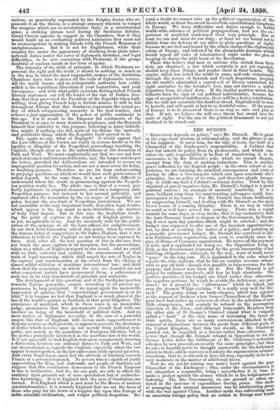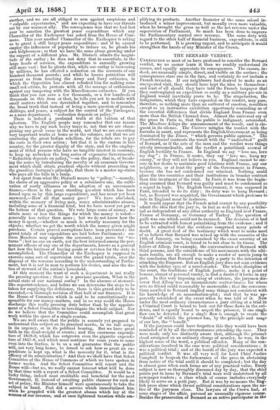THE BUDGET.
" REDUCTION depends on policy," says Mr. Disraeli. He is great in the copy-book wisdom of statesmanship, and the phrase is one of his happiest. It saves him, for the time at least, one-half of a Chancellor of the Exchequer's responsibility. A cabinet that does but inherit its policy from its predecessors, and which ems- siders its only responsibility to be that of transferring it to its successors, is, by Mr. Disraeli's rule, which we cannot dispute, exempt from the duty of making reductions. This is another grave reflection for the English people : in the stern school of ex- perience, we are learning the practical consequences and costs el having in office a Government which acts upon somebody else's principles, has no policy of its own, and therefore pleads incapa- city to fulfil one-half a Cabinet's ordinary duties. Tried by this standard of purely negative duty,Mr. Disraeli's budget is a grand political success ; an example of masterly inactivity. It is a more brilliant coup than his most trusting colleagues could have anticipated at his hands. For Mr. Disraeli has shone brilliantly by suppressing himself, and dealing with Mr. Disraeli as the mere locum tenena of a coming Ministry. There is no way in which he could so well have served his country. There was a report current for some days, or even weeks, that it lay exclusively with the Anti-Treasury bench to dispose of the Government, by throw- ing it over upon. any question which might be selected ; and the budget was supposed to offer one of the broadest opportunities; but, by dint of avoiding the duties of a policy, and patching up 4 passable provisional budget, Mr. Disraeli has contrived to dis- arm Parliameutary reprobation, and even to conciliate some de- gree of House of Commons approbation. He staves off the payment of debt, and is applauded for doing so ; the Opposition being as little as the Government impressed by the gross immorality of not fulfilling obligations ; although, by the wav, want of truth never " pays " in the long run. He is applauded to the echo when he repeats the trite sophism, that he has no surplus revenue where- with to pay off debt ; though it is possible to raise revenue for that purpose, and honest men often do it. But Mr. Disraeli is net Judged by ordinary standards, still less by high standards. The positive particles of his budget are liked rather than otherwise, the negative portions, by which he avoids the deficiency, are par- doned ; he is granted the " allowances " which he asked, and even the sternest Whigs exclaim, " It is really very well for Dis- raeli." The penny stamp on bank-cheques, which was rejected at the request of bankers when former Chancellors a the xche- quer have had rather an embarras de choir in the selection of new little stamp-taxes, will scarcely be refused on the peremptory objection of Mr. Glyn ; and although honourable Members from the other side of St. George's Channel raised what is vulgarly called a " howl " at the very name of inereaaing the taxes on Irish spirits, there are so many conveniences attached to the removal of distinctions between the goods from different parts Of the United Kingdom, that this tax should, as Mr. Gladstone pointed out, be regarded as a favour rather than otherwise. It is true that, though Mr. Disraeli refused in Opposition to let Sir George Lewis defer the fulfilment of Mr. Gladstone's reduction schemes, he now proceeds on exactly the same principles ; but then he asks so humbly not to be thought answerable for the deficiency which he finds, and he conveys so tenderly the argumentum ad nrse- rie.ordiarn, that he is allowed to have his way, especially as he is so very moderate in the matter of additional taxes. Now we are not for raising any man's hand against the poor Chancellor of the Exchequer ; who, under the circumstances,not altogether a responsible being ; nevertheless it is time t0
make a protest against the abuses which.- he in his helplessness is fostering. The late Government, on one ground or other, as- sisted in the increase of expenditure during peace. One mode of managing that unusual manoeuvre was by adulterating peace with the war against China. Another mode was cultivating such an uncertain foreign policy that no nation in Europe now trusts
another, and we are all obliged to arm against suspicions and " culpable expectancies," and are expecting to have our throats cut by our warmest ally. The consequence was that we had last year to sanction the greatest peace expenditure which any Chancellor of the Exchequer has asked from the House of Com- mons. This year another Chancellor of the Exchequer is asking us to grant a still larger peace expenditure : and if he cannot employ the influences of popularity to induce us, he pleads his own helplessness ; so that we have the same abuse rowing under the support of a different plea. Mr. Disraeli admits the magni- tude of the outlay ; he does not deny that in essentials, in the large heads of services, the expenditure is annually growing still more vast ; but he pleads that, while our outlay is increasing by millions, he has effected a reduction on the accounts of one hundred thousand pounds; and while he knows patriotism will prevent us from touching the Army and Navy estimates, in which the Opposition has almost rebuked him for making some small reductions, he protests with all the courage of enthusiasm against any tampering with the Miscellaneous estimates. If you think that you can save a few thousands, or a few hundreds of thousands on this item or that, he tells you not to meddle with small matters which are dovetailed together, and to remember the broad truth that instead of being a mere question of pounds, shillings, and pence, a subject for the control of the Exchequer, as a mere department, "reduction depends on policy." There is indeed a profound truth at the lottom of that aphorism. The English people may remember that one reason why we have to pay such heavy taxes is, not that we are cham- pioning any great cause in the world, not that we are executing very important works at home or in the colonies, not that we are combating. the great Indian rebellion, for the rebels are to pay the costs in their own action; but that it is the custom in this country, for the greater dignity of the state, and for the employ- ment of titled persons who have no tangible interest in economy, to keep up unbroken the lOng series of expensive Governments. "Reduction depends on policy," —on the policy, that is, of break- ing the series by introducing the novelty of an economic Govern- ment which shall attain practical objects without proceeding on the grandiose footman's principle, that there is a master up-stairs who pays all the bills in a lump. For apart from what Mr. Disraeli means by ".policy,"—namely, the choice of an aggressive policy or a submissive one, the culti- vation of costly alliances or the adoption of an uneconomic finance,—there is the great standing question which has been forced upon us by this large expenditure, and has never yet been
answered —How all that money goes We have abolished, within the memory of living men, many administrative abuses, including some of a financial kind, but we have never yet got to the bottom of that question. We vote large sums of money, we attain more or less the things for which the money is voted-- generally less rather than more ; but we do not know how the money is spent,—whether so much is actually necessary for the objects; whether we get the worth which the money given might purchase. Certain proved corruptions have been prevented ; the grand totals of our expenditure are laid before Parliament; cu- rious Members may explore the accounts, may move for "re- turns " ; but no one on earth, not the best informed among the per- manent officers of any one of the departments, knows as a general fact how the business of buying goods or services for the state is accomplished. The Chancellor of the Exchequer is supposed to exercise some sort of supervision over the grand totals, over the disposal of the revenue according to the understanding of Parlia- ment, but it is not in man to perform his duties, and also the du- ties of steward of the nation's household.
At this moment the want of such a department is not really the pressing question ; there is a previous question, What is the actual state of our national outlay ? In the absence of steward- like superintendence, and before we can determine the steps to be taken for supplying the deficiency, there is this grand duty to be executed,—a thorough revision of that half of our finances. It is the House of Commons which is said to be constitutionally re- a onsible for our money-matters, and in no way could the House discharge this really pressing duty better than by the appoint- ment of a Select Committee to investigate the whole subject. Nor do we believe that the Committee could accomplish that great work within the space of a single session. We are well aware that the public is scarcely yet prepared to understand this subject on its practical merits, in its full scope, in its urgency, or in its political bearing. But we have great faith in the dead-weight of events; and this enormous expendi- ture of 1858-9, which has outgrown even the gigantic expendi- ture of 1857-8, and which must continue for some years to come even into the Sixties, is to us a sad guarantee that the public will, not very long hence, be forced to ask how so great an ex- penditure is kept up, what is the necessity for it, what is the efficacy of its administration ? And then we shall have that Select . Committee of the House of Commons of which we have spoken in former weeks. And the Select Committee will report and the House will—but no, we really cannot forecast what will be done by that time with a report of a Select Committee. It would be a lucky thing, indeed most creditable and beneficial • for the next Government, if, instead of awaiting public clamour for such an act of policy, the Minister himself were spontaneously to take the subject in hand. Peel did a service which immortalized him when he grappled with the greatest abuses which lay at the sources of our revenue, and at once lightened taxation while am-
plifying its products. Another financier of the same school in- troduced a minor improvement, but morally even more valuable, when he brought the gross as well as the net revenue under the supervision of Parliament. So much has been done to improve the Parliamentary control over revenue. The same duty with regard to the other half of financial business, expenditure, is still to be performed. It is growing. urgent, and to anticipate it would strengthen the hands of any Minister of the Crown.



























 Previous page
Previous page